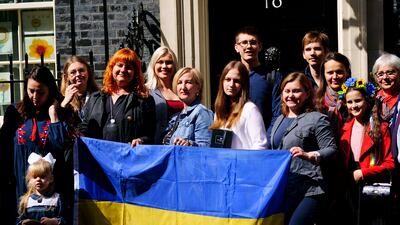Prime Minister Liz Truss has been urged to bring an end to the uncertainty gripping Ukrainian refugees in Britain by ensuring the continuation of the Homes for Ukraine scheme.
Seven months on from the launch of the programme that allows UK households to host Ukrainians fleeing the Russian invasion, campaigners say new reassurances from the government are needed to put minds at ease.
In a joint letter to Ms Truss, a coalition of more than 30 leading civil society organisations and groups helping refugees say they fear the scheme is being “quietly phased out”.
They want to see her make a public pledge that the accommodation and financial help on offer will continue throughout the winter and beyond. They say the government must “be part of the solution, not further trauma”.
Thousands of Ukrainians, mostly women and children, are staying with families and individuals who are entitled to a monthly £350 ($380) “thank you” payment. Lord Richard Harrington lobbied for the amount to be doubled before he stood down as refugees minister in September.
In her recent Conservative Party conference speech, Ms Truss said the UK would “stand with our Ukrainian friends for as long as it takes”. Now, campaigners want to see her turn her words into action.
“The UK has a proud history of leading the fight against tyrants and standing up for the oppressed," the open letter reads.
“Homes for Ukraine sits firmly within that tradition, which is why we hope the government will now make clear — to host families, and refugees alike — that their commitment remains unwavering.”
The groups — including More in Common, the Refugee Council and the Sanctuary Foundation — have four main demands for the government:
· the introduction of an extra winter payment to help hosts amid the cost-of-living crisis
· the appointment of a new refugees minister
· help for Ukrainians who want to rent or buy homes in the UK
· a fresh approach to refugee settlement based on the success of Homes for Ukraine.
The groups suggested a database could be created of landlords willing to rent properties to refugees.
“With the war far from over, and entering an even more dangerous and uncertain phase, we need renewed reassurance and guarantees that the Homes for Ukraine scheme will continue,” said Luke Tryl, UK director of More in Common.
Lesia Scholey, a volunteer at ECAN refugee charity in Surrey, said a long-term plan is desperately needed to bring an end to the uncertainty experienced by Ukrainian refugees.
“Since the day they arrived seeking refuge and safety in the UK, Ukrainian families, many of whom are mothers and young children, have been asking what will happen to them when a hosting agreement comes to an end,” said Ms Scholey, who hosts refugees in her own home.
“To see many now facing homelessness, due to a lack of clear mechanisms for housing, is causing much grief.
“The UK government must introduce a long-term plan for those on three-year visas and be part of the solution, not further trauma for displaced persons.”
The letter comes after several media reports in recent weeks cited cases where Ukrainian refugees are facing homelessness because their hosts will not continue to take part in the scheme beyond the six-month minimum stay.
The Local Government Association said it was deeply concerned about the growing number of Ukrainians presenting as homeless.
Ukrainian refugees arrive in Europe - in pictures
About 96,800 Ukrainians have arrived in the UK under the Homes for Ukraine scheme since it was launched in March, latest government figures show.
The number of Ukrainian households that have become homeless or at risk of becoming so after arriving in England is 1,915 — most of which are families with children.
These figures, from the Department for Levelling Up, Housing and Communities, also include Ukrainians who arrived under the separate Family Scheme.
YouGov polling for the group More in Common, of 2,000 people in July, suggests the scheme remains popular, with about 70 per cent of the public wanting it to continue and 15 per cent opposed.
James Jamieson, LGA chairman, said it was crucial that financial support for sponsors was increased.
“As we approach the end of the initial six-month sponsorships, it is clear that increasing numbers are ending," Mr Jamieson said.
“We are deeply concerned at the growing number of Ukrainians presenting as homeless to their council, and in particular the significant rise in the number of those who arrived through the Homes for Ukraine scheme.”
Romanian hotel ballroom becomes shelter for Ukrainian refugees - video
“The Homes for Ukraine scheme will continue as the UK government and British people continue to go above and beyond to support those fleeing war," a government spokeswoman said.
"All arrivals have access to benefits and employment from day one. The majority of sponsors want to continue hosting for longer than six months.
"Where guests do move on, they have a number of options, including renting or finding a new sponsor.
“Councils have a duty to ensure families are not left without a roof over their heads, and receive £10,500 a person to cover costs.”


















